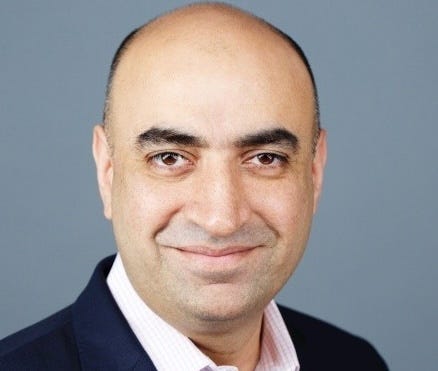Issue № 138 | London, Sunday 1 June 2025
Read on to learn why:
① Things can go wrong when you stray too far from your core.
② Customers won’t buy unless they understand which problem you solve.
③ The new US financial system is untested in a crisis. And that should worry us.
④ It’s been a bad news week for fintech in the UK.
⑤ Compelling writing is both an art and a science.
⑥ Sometimes you just have to eat your own dog food.
⑦ You should hire for attitude, not skills.
📸 But first, flashback to last June when I told you that marketing belongs in the boardroom but most marketers are ill-prepared. This week, HBR did a deep dive on how to build trust with your board.
What's new
Lloyds launched a travel service this week, FSTech reports.

In short:
“Lloyds Banking Group has launched a new travel booking service on its mobile app in a UK-bank first. The new service, powered by travel tech platform Hopper, enables customers to book flights and accommodation worldwide.”
“Once a customer has booked, they can keep track of their trips directly in the Lloyds app.”
“The move follows the roll out of several travel-related products at the bank, including foreign exchange and travel money services, breakdown cover for travel in the UK, and travel insurance.”
Why it matters
Like all men with mild insecurities, I own a ludicrously large Swiss army knife. Truth be told though, it’s a pretty poor knife. Now that I think about it, it’s a fairly useless corkscrew, can opener, compass and saw. But I didn’t buy it for those features. I bought it so I would feel ready for anything. Like a real man should…right?!
The best products, no matter how feature rich - and the marketing that promotes them - focus on solving one clear problem. Victorinox’s marketing doesn’t promise you a great knife. It teases something else entirely: peace of mind.
The Swiss Army Knife™ ensures you’re always prepared.
Back to Lloyds. I want my bank to be the very best place to manage my money. I want my travel app to be the very best place to manage my travel. Combining the two feels confused because it’s solving two entirely different problems. So, Lloyds’ foray into travel services matters because it shows how easily things can go wrong when you stray too far from your core. Similarly, I don’t want Airbnb to go from being a convenient way to book accommodation to becoming “a global community where you can live, travel and belong anywhere”, nor do I want a social media app to offer me payment options.
① Speaking of which, a lifetime ago, when I worked at SWIFT, there was an odd phenomenon. The ExCo were adept at picking up on whatever the latest book on the CEO’s nightstand was. They’d read it and pass it to their direct reports. Soon it would filter down the rank and file until even the likes of me had read Jim Collins’ Good to Great, Malcolm Gladwell’s The Tipping Point, and ex-Bain & Company consultant Chris Zook’s Beyond the Core. The premise of the latter is simple and not dissimilar to the point I’m making here: while expanding your product offering, you shouldn’t abandon your roots.
What to do about it
Take action
Your product or service may well be complex and multi-faceted, it may be overflowing with clever features and offer a wealth of options. And, yes, at some point in your customer’s buying journey those will likely need explaining to them. But you won’t get there unless you’re first clear about what the problem is that you’re solving.
② You can be a generalist, you can offer a wide range of features and choice. But your customers won’t buy unless they can easily and quickly understand which of their problems you’re going to solve.
I’m working with a brand at the moment that serves private markets funds. We offer a very feature-rich technology platform combined with the power of human support with specialist expertise. The product offering is complicated, the issues highly complex, but the problem we solve is simple: we help fund managers raise bigger funds faster.
What problem do you solve?
Get help
Two ways I can help you: 1) hire me as a full-time member of your team; or 2) use InMarketing, an advisory service for senior leadership teams in finance and tech.
🔎 Audit 🧭 Strategy 🖋️ Positioning ✅ Planning 🤷🏻 Problem-solving ☎️ Counsel
Top stories
The other articles that are worthy of your time.
FINANCIAL SERVICES
American finance, always unique, is now uniquely dangerous
③ The new US financial system is untested in a crisis. And that should worry us.

“When you think of financial risk, you may picture investment-banking capers on Wall Street or subprime mortgages in Miami. But over the past decade American finance has been transformed. A mix of asset managers, hedge funds, private-equity firms and trading firms—including Apollo, BlackRock, Blackstone, Citadel, Jane Street, KKR and Millennium—have emerged from the shadows to elbow aside the incumbents. They are fundamentally different from the banks, insurers and old-style funds they have replaced. They are also big, complex and untested.”
“Mr Trump is hastening the next financial crisis by playing havoc with trade, upending America’s global commitments and, most of all, by prolonging the government’s borrowing binge. America’s financial system has long been dominant, but the world has never been as exposed to it. Everyone should worry about its fragility.”
“A toxic combination of uncertainty, institutional conflict, volatile asset prices, higher capital costs and economic weakness threatens to put the new-look financial system under almighty strain.”
TECHNOLOGY
Why Britain’s fintech dream is faltering
④ It’s been a bad news week for fintech in the UK.

“While ‘open banking’ has found success in various corners of finance - such as by enabling faster lending decisions and new budgeting tools - it has so far failed to deliver the promise of powering a payments revolution.”
“The fanfare around open banking arose as fintech boomed in the UK in the last decade, at a time when regulators sought to foster competition in the wake of the financial crisis. This helped position London as a leader in the sector. It became home to Europe’s most highly valued start-up, Revolut, and the second most attractive destination for fintech investment after the US, according to trade body Innovate Finance.”
“But the British homegrowns have failed to turn a profit while higher interest rates have damped investor sentiment for the sector. Lossmaking TrueLayer laid off a quarter of its workforce last year before announcing a 30 per cent valuation drop that toppled its $1bn ‘unicorn’ valuation status. Rival GoCardless — a company co-founded by Monzo founder Tom Blomfield — cut 20 per cent of its workforce in 2023 in a bid to reduce cost and reach profitability by 2026.”
👀 See also: Barclays head of fintech strategy leaves and Starling Bank: The rise and fall of a fintech darling
MEDIA & MARKETING
Writing that works: Simple principles behind high-converting content
⑤ Compelling writing is both an art and a science.
“Content that converts usually shares three traits
It addresses a clear, specific problem
It offers a believable, easy-to-understand solution
It motivates the reader to take action.”
“Principles to follow:
Anchor the message in real needs
Focus on clarity, then tone
Use friction to guide, not block
Guide with structure, not tricks
Ask for the right action”
“In high-performing content, every sentence earns its place. Every claim supports a point. Every action requested makes sense in context.”
WILDCARD
McKinsey slashes 10 per cent of jobs in major overhaul
⑥ Sometimes you just have to eat your own dog food.

“Consulting giant McKinsey has unleashed one of the largest job culls in the company’s history after ten per cent of staff faced the chop.”
“The New York-headquartered firm has reversed major expansion plans, which peaked during the pandemic, as it aims to drive profitability.
The consulting firm has reduced its workforce to 40,000 over the last 18 months, down from 45,000.”
“This comes amid a sharp downturn in revenue across the sector. Whilst its 2024 report, published earlier this month, did not include staff numbers or an annual revenue figure, McKinsey recorded $16bn in revenue for 2023.”
Off cuts
The stories that almost made this week’s newsletter.
FINANCIAL SERVICES
🪤 Is private equity becoming a money trap?
🇬🇧 Natwest returns to private ownership
🏃🏻♀️➡️ JPMorgan Chase hires former HSBC global mergers chief as investment bank exodus continues
🥳 Ex-BoE deputy governor Charlotte Hogg appointed as CEO of Alter Domus
✂️ HSBC cuts more investment bank roles in latest European retreat
TECHNOLOGY
🐎 Lloyds Bank hires former HSBC exec as head of agentic AI
🇪🇺 Digital euro emerging as a transformative force
🏦 Why back-office innovation is reinventing SME banking
🤑 FCA seeks further views on stablecoins and crypto custody
💰 Stablecoin firm Circle launches IPO with $5.4bn valuation
MEDIA & MARKETING
✍🏻 The future of the CMO: Why marketing’s top job is being rewritten
🧑🏻💻 ABM isn’t the B2B salvation we were promised
📰 How Britain's most established news brands are reinventing themselves
📊 Why marketers are rethinking SEO, ad buying, and data use
👏🏻 Digital Asset appoints Jonathan Isaac as chief marketing officer
The last word
⑦ Umar Farooq, global co-head of JPMorgan Payments, on what he hires for:

“The biggest quality for a young professional is curiosity, a willingness to ask questions and make things better.”
Don’t settle for marketing.
Aspire to InMarketing.
Wishing you an innovative week,
P.S. I was at the BFI this week to catch the latest Mission: Impossible on an IMAX screen. I’m sad to report it’s not the swan song this great series deserved.





